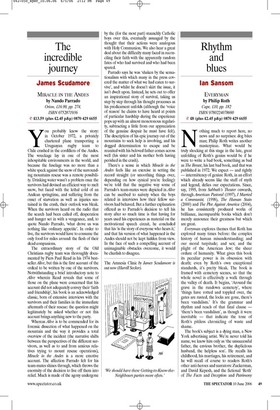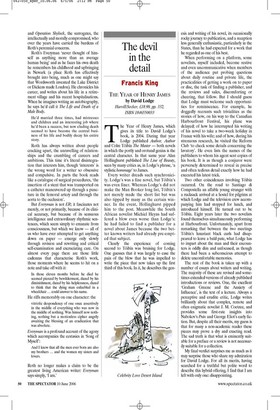Rhythm and blues
Ian Sansom
EVERYMAN by Philip Roth Cape, £10, pp. 182 ISBN 9780224078690 ✆ £8 (plus £2.45 p&p) 0870 429 6655 Nothing much to report here, no news and no surprises: dog bites man; Philip Roth writes another masterpiece. What would be truly shocking at this stage in the late, great unfolding of Roth’s genius would be if he were to write a bad book, something as bad as The Breast, his last bad book, and that was published in 1972. We expect — and rightly — intermittency of genius: Roth, in an effort which already seems like the stuff of myth and legend, defies our expectations. Since, say, 1995, from Sabbath’s Theater onwards, through American Pastoral (1997), I Married a Communist, (1998), The Human Stain (2000) and The Plot Against America (2004), he has consistently produced works of brilliance, incomparable books which don’t merely announce their greatness but which are great.
Everyman explores themes that Roth has explored many times before: the complex history of human misunderstanding; and our moral turpitude; and sex; and the plight of the American Jew; the sheer ordure of humanity. What gives this book its peculiar power is its obsession with death; even by Roth’s own exceptional standards, it’s pretty bleak. The book is framed with cemetery scenes, so that the whole novel is effectively a walk through the valley of death. It begins, ‘Around the grave in the rundown cemetery’, where ‘things have rotted and toppled over, the gates are rusted, the locks are gone, there’s been vandalism.’ It’s the grammar and rhythm and reach of that final clause — ‘there’s been vandalism’, as though it were inevitable — that indicate the tone of Roth’s pitiless chronicling of waste and shame.
The book’s subject is a dying man, a New York advertising artist. We’re never told his name, we know him only as ‘the unsuccessful father, the envious brother, the duplicitous husband, the helpless son’. He recalls his childhood, his marriages, his retirement, and he will recall of course to readers Roth’s other anti-heroes and narrators: Zuckerman, and David Kepesh, and the fictional ‘Roth’ of The Facts and Deception and Patrimony and Operation Shylock, the surrogates, the intellectually and morally compromised, who over the years have carried the burdens of Roth’s perennial concerns.
Roth’s Everyman ‘never thought of himself as anything more than an average human being’ and as he faces his own death he remembers his childhood and upbringing in Newark (a place Roth has effectively brought into being, much as one might say that Wordsworth invented the Lake District or Dickens made London). He chronicles his career, and writes about his life in a retirement village and his recent hospitalisations. When he imagines writing an autobiography, he says he’d call it The Life and Death of a Male Body.
He’d married three times, had mistresses and children and an interesting job where he’d been a success, but now eluding death seemed to have become the central business of his life and bodily decay his entire story.
Roth has always written about people cracking apart, the unravelling of relationships and the crumbling of careers and ambitions. This time it’s literal disintegration that interests him, though ‘interests’ is the wrong word for a writer so obsessive and compulsive. In parts the book reads like a catalogue of surgical procedures, ‘the insertion of a stent that was transported on a catheter maneuvered up through a puncture in the femoral artery and through the aorta to the occlusion’.
But Everyman is not ER; it fascinates not merely, or not primarily, because of its clinical accuracy, but because of its sensuous intelligence and extraordinary rhythmic sentences, which seem simply to emanate from consciousness, but which we know — all of us who have ever attempted to get anything down on paper — emerge only slowly through revision and rewriting and critical self-examination and excruciating care. On almost every page there are those little cadenzas that characterise Roth’s work, those moments where he seems to hit on a note and take off with it:
In those eleven months before he died he seemed pierced by bewilderment, dazed by his diminishment, dazed by his helplessness, dazed to think that the dying man enfeebled in a wheelchair ... could answer to his name.
He riffs memorably on one character: the
vitriolic despondency of one once assertively in the middle of everything who was now in the middle of nothing. Was himself now nothing, nothing but a motionless cipher angrily awaiting the blessing of an eradication that was absolute.
Everyman is a profound account of the agony which accompanies the ecstasies in ‘Song of Myself’:
And I know that all the men ever born are also my brothers ... and the women my sisters and lovers.
Roth no longer makes a claim to be the greatest living American writer: Everyman says simply, ‘I am.’



















































































 Previous page
Previous page